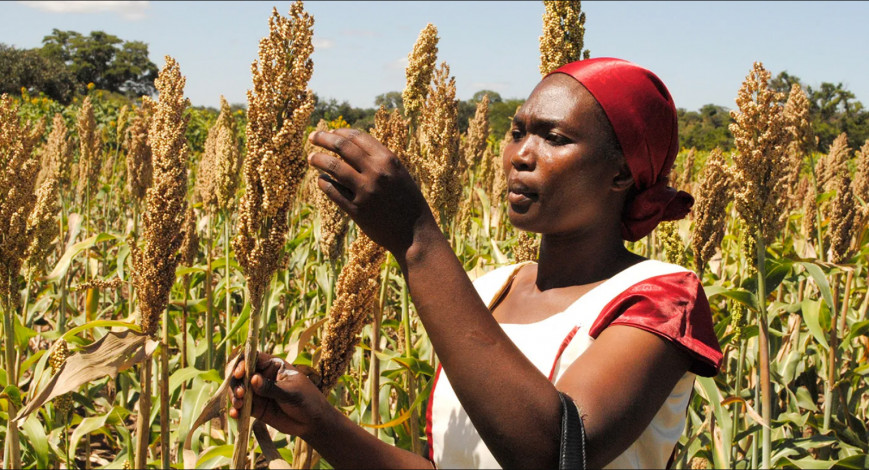
A sorghum farmer in Tanzania. Photo: Collected
* Farmers in Tanzania prefer sorghum varieties that are tolerant to environmental stresses are high yielding, early maturing with white grain colour and capable of fetching higher grain prices.
* Farmers are willing to pay the highest premium for tolerance to environmental stresses, amounting to an average of three times the willingness to pay for other traits.
* Demand for sorghum has increased rapidly over the years as it is widely used to produce clear (lager) beer and non-alcoholic drinks apart from its utilization for food purposes.
* The study has important implications for demand-driven variety development that could contribute to improving crop productivity and household welfare.
Against the backdrop of recurring adverse climatic and agronomic conditions, such as drought, disease, and pests in Africa, a study by researchers from the International Crops Research Institute for the Semi-Arid Tropics (ICRISAT) has established that environmental stress-tolerant sorghum varieties are most valued among Tanzanian farmers.
The results could contribute to improved crop productivity and household welfare.
Sorghum is well-adapted to arid and semi-arid environments with limited rainfall and high temperatures, where other cereal crops such as maize cannot grow.
Its importance has risen following the prevailing threat of climate change and global warming because it is proven to provide a harvest even in bad years.
While sorghum is used mostly for food purposes, its demand has grown rapidly in Tanzania over the past few years as it is widely used to produce clear (lager) beer, non-alcoholic drinks, and bioenergy drink production.
The study, led by Mequanint B Melesse, Cluster Leader – Technology Adoption and Impact Analysis, ICRISAT, published in the Journal of Crop Improvement, used a choice experiment design to evaluate farmers’ preferences for traits of sorghum varieties in Tanzania.
The experiment involved six key sorghum attributes: yield, maturity, grain price, color, tolerance to environmental stresses (disease, pest and drought) and cost of seed to evaluate farmers’ preferences.
The analysis relied on data collected between October-December 2019 from six regions – Dodoma, Singida, Shinyanga, Tabora, Songwe, and Mara. A multistage sampling design was employed to select sample households. A total of 1,301 sorghum farmers were interviewed to understand their preferences.
It was found that farmers strongly valued sorghum varieties that are high yielding and capable of fetching a high grain price, thereby enhancing their household income.
“On average, farmers were willing to pay TSh 6,280 (about US$2.7) to move from a non-stress tolerant to a stress-tolerant seed variety. Farmers were willing to pay for tolerant varieties two times the amount they were willing to pay for an increase in grain yield of two tons/ha. A tolerant variety was valued about six times the value respondents attached to a change from the longest maturity to the shortest maturity variety,” stated the study.
The study further showed that a tolerant variety was also valued four times higher than both the value farmers were willing to pay for changing a sorghum variety from one fetching 250 TSh/kg grain price, to one fetching 550 TSh/kg grain price, and from red/brown coloured grain to white.
Sorghum covers about 0.8 million hectares of land annually, with average productivity of about 1,000 kg/ha in Tanzania. More than 70% of the respondents favoured a tolerant seed variety, higher grain prices and a shorter maturity period.
In addition, farmers also revealed strong preferences for early maturing sorghum varieties.
“Early maturing varieties lower the cost of production with respect to input usage, overcome unpredictable weather patterns and allow multiple cycles of production per season, as well as help poor households to bridge lean seasonal consumption shocks,” stated the study.
|Source: Online/KSU
Comment Now